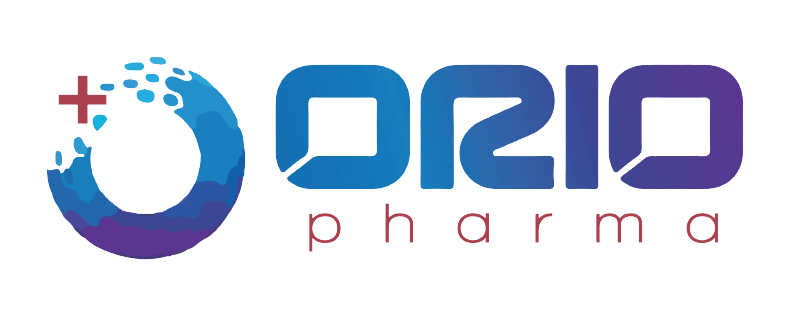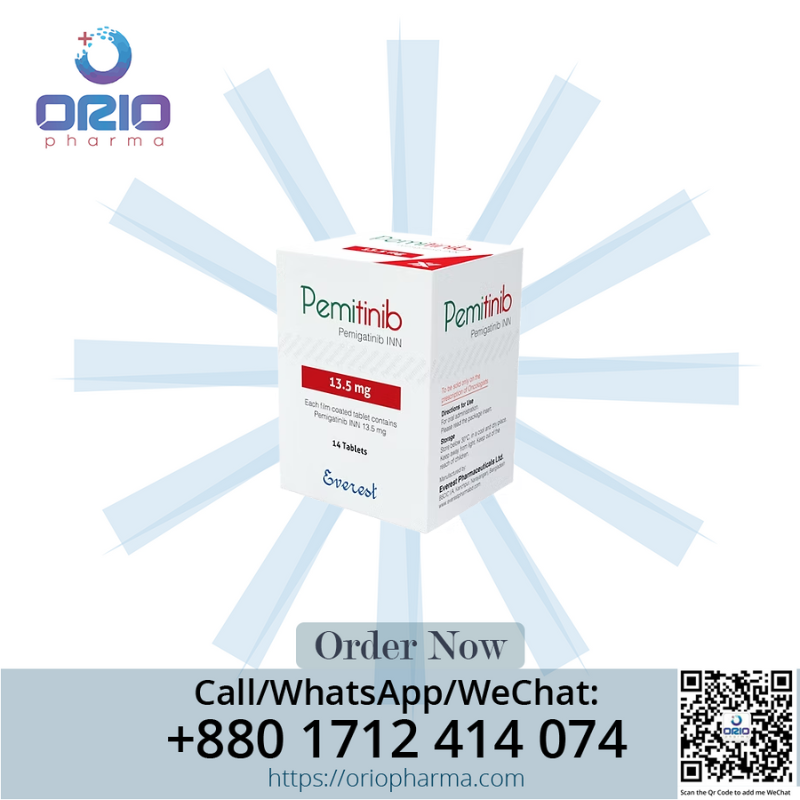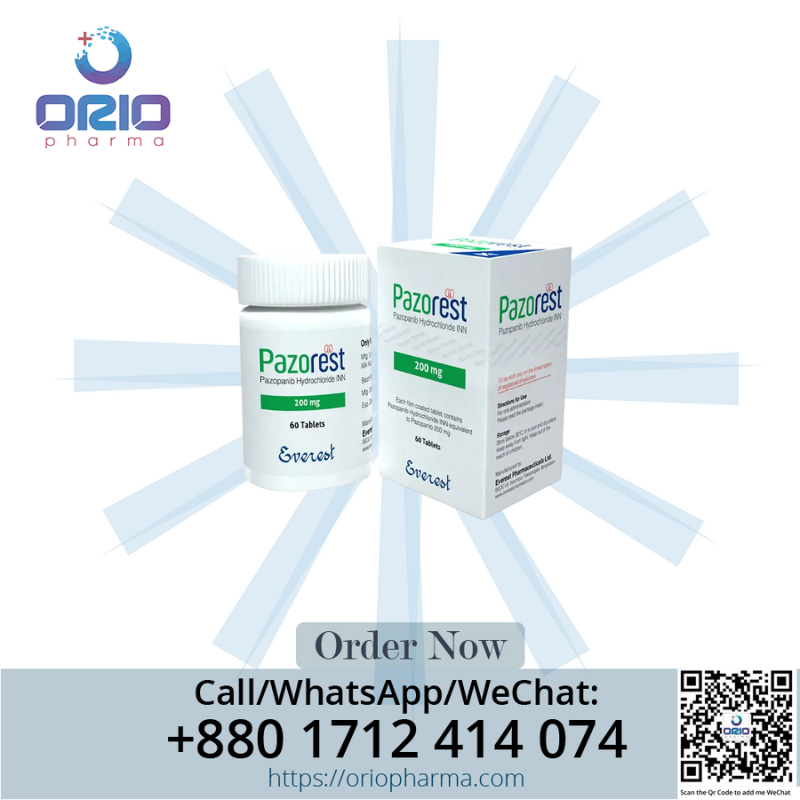Introduction
Pemitinib 13.5 mg is an oral targeted therapy designed for the treatment of patients with certain cancers characterized by fibroblast growth factor receptor (FGFR) genetic alterations. Developed with a precision medicine approach, Pemitinib acts as a small molecule FGFR inhibitor, offering a novel therapeutic option for individuals with advanced or metastatic malignancies. Manufactured by Everest Pharmaceuticals Ltd and supplied globally by Orio Pharma, Pemitinib reflects the cutting-edge in oncology pharmacotherapy.
Key Indications
Pemitinib is indicated for the treatment of adults with previously treated, unresectable, locally advanced or metastatic cholangiocarcinoma (bile duct cancer) harboring FGFR2 gene fusions or rearrangements. It may also be explored for other FGFR-altered tumors under physician guidance.
Mechanism of Action
Pemigatinib, the active molecule in Pemitinib, selectively inhibits FGFR1, FGFR2, and FGFR3. FGFRs are tyrosine kinase receptors that regulate critical cellular processes such as proliferation, differentiation, migration, and survival. Genetic alterations in FGFR, such as fusions or mutations, can lead to uncontrolled cell division and tumor growth. By blocking these receptors, Pemitinib interferes with downstream signaling, thus halting tumor progression and promoting cancer cell apoptosis.
Dosage and Administration
The standard recommended dosage of Pemitinib is 13.5 mg orally once daily for 14 consecutive days, followed by 7 days off therapy in 21-day cycles. Tablets should be taken at the same time each day with or without food. Dose modifications may be required based on individual patient tolerance, adverse reactions, or organ function impairment.
Important Notes:
- Swallow tablets whole. Do not crush, split, or chew.
- Treatment should be initiated under the supervision of an experienced oncologist.
Pharmacokinetics
Pemigatinib is absorbed with peak plasma concentration achieved in 1–2 hours post-administration. It undergoes hepatic metabolism predominantly via CYP3A4. The drug has a terminal half-life of approximately 15–20 hours and is eliminated through both feces and urine. Pharmacokinetics may vary in patients with hepatic or renal impairment.
Side Effects
Common adverse effects (≥20%) reported in clinical trials include:
- Hyperphosphatemia
- Alopecia
- Diarrhea
- Fatigue
- Dry mouth
- Dysgeusia (taste changes)
- Nail toxicity
- Stomatitis
- Decreased appetite
- Nausea and vomiting
Serious side effects include retinal pigment epithelial detachment, elevated liver enzymes, and electrolyte imbalance. Periodic monitoring is essential.
Contraindications
- Hypersensitivity to Pemigatinib or any component of the formulation
- Pregnancy and breastfeeding
- Severe hepatic or renal dysfunction (unless under strict medical supervision)
Warnings and Precautions
- Ocular Toxicity: Conduct ophthalmologic examinations periodically.
- Electrolyte Imbalance: Monitor serum phosphate, calcium, and magnesium levels.
- Embryo-Fetal Toxicity: Avoid use during pregnancy. Effective contraception must be used during treatment and for at least 1 week after the final dose.
- Hepatotoxicity: Monitor liver function tests regularly.
- Growth Plate Effects in Pediatrics: Not recommended in pediatric patients.
Drug Interactions
- Co-administration with strong CYP3A4 inhibitors (e.g., ketoconazole) may increase plasma levels of Pemitinib.
- CYP3A4 inducers (e.g., rifampicin) may decrease its efficacy.
- Concurrent use with proton pump inhibitors may alter drug absorption.
Use in Special Populations
- Pregnancy: Contraindicated due to risk of fetal harm.
- Lactation: Breastfeeding should be discontinued during treatment.
- Geriatric: No specific dosage adjustments, but close monitoring is advised.
- Hepatic/Renal Impairment: Dose modifications may be necessary based on severity.
Overdose Management
In the case of suspected overdose, supportive measures should be employed. There is no specific antidote for Pemigatinib. Symptoms of overdose may include increased severity of known side effects.
Clinical Efficacy
In the FIGHT-202 trial, Pemigatinib demonstrated a 35.5% overall response rate in patients with FGFR2 fusion-positive cholangiocarcinoma. Responses included complete and partial tumor shrinkage, with a median progression-free survival of over 6 months.
Storage Conditions
Store at room temperature below 30°C. Protect from moisture and direct sunlight. Keep out of reach of children.
Conclusion
Pemitinib 13.5 mg offers an innovative solution in the targeted treatment of FGFR-altered cholangiocarcinoma and other potential malignancies. With a favorable safety profile and clinical efficacy, it represents a promising advancement in personalized oncology care. Orio Pharma is committed to supplying high-quality oncology solutions worldwide, supporting advanced cancer care with integrity and excellence.





